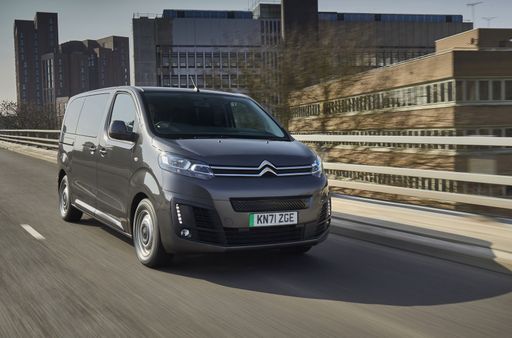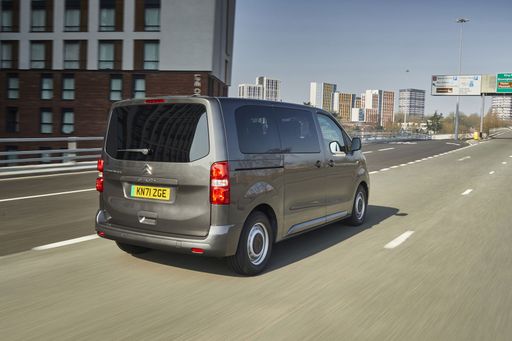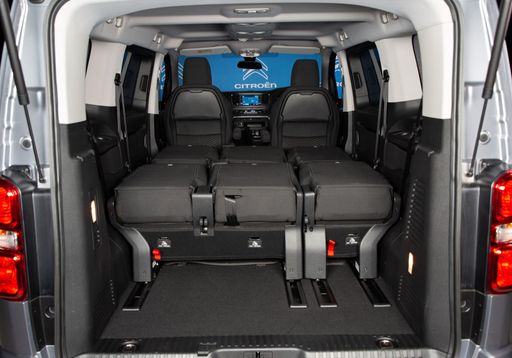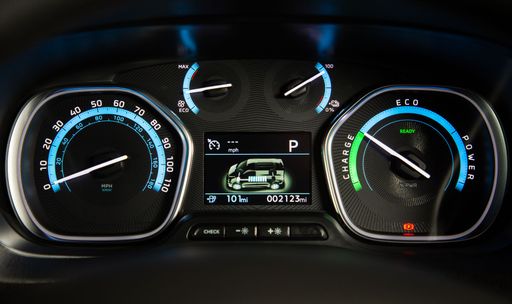Citroen Spacetourer VS Toyota C-HR – Specs, Efficiency & Price Comparison
Which model is the better choice – the Citroen Spacetourer or the Toyota C-HR? We compare performance (177 HP vs 223 HP), boot capacity (2011 L vs 447 L), efficiency (24.30 kWh7.30 L vs 0.80 L), and of course, the price (33100 £ vs 30000 £).
Find out now which car fits your needs better!
The Citroen Spacetourer (Bus) is powered by a Electric or Diesel engine and comes with a Automatic transmission. In comparison, the Toyota C-HR (SUV) features a Full Hybrid or Plugin Hybrid engine and a Automatic gearbox.
When it comes to boot capacity, the Citroen Spacetourer offers 2011 L, while the Toyota C-HR provides 447 L – depending on what matters most to you. If you’re looking for more power, you’ll need to decide whether the 177 HP of the Citroen Spacetourer or the 223 HP of the Toyota C-HR suits your needs better.
There are also differences in efficiency: 24.30 kWh7.30 L vs 0.80 L. In terms of price, the Citroen Spacetourer starts at 33100 £, while the Toyota C-HR is available from 30000 £.
Compare all the key specs now and find out which model fits your lifestyle best!
Citroen Spacetourer
The Spacetourer redefines versatility with its spacious interior and comfortable seating for families and groups. Its stylish exterior and thoughtful design features make it not just a practical choice, but an attractive one for modern drivers. Whether for daily commutes or adventurous road trips, the Spacetourer seamlessly blends functionality and flair.
details @ media.stellantis.com
@ media.stellantis.com
 @ media.stellantis.com
@ media.stellantis.com
 @ media.stellantis.com
@ media.stellantis.com
 @ media.stellantis.com
@ media.stellantis.com
Toyota C-HR
The Toyota C-HR stands out with its distinctive and bold design that combines sleek, angular lines with a sporty posture. Its comfortable and stylish interior is equipped with advanced technology features, providing a seamless driving experience. The vehicle offers impressive handling and performance, making it a compelling choice for those who appreciate a blend of practicality and flair on the road.
details @ Toyota
@ Toyota
 @ Toyota
@ Toyota
 @ Toyota
@ Toyota
 @ Toyota
@ Toyota
 @ Toyota
@ Toyota

|

|
|
|
|
Costs and Consumption |
|
|---|---|
|
Price
33100 - 52100 £
|
Price
30000 - 42800 £
|
|
Consumption L/100km
7.3 - 7.4 L
|
Consumption L/100km
0.8 - 5.1 L
|
|
Consumption kWh/100km
24.3 - 24.9 kWh
|
Consumption kWh/100km
-
|
|
Electric Range
217 - 351 km
|
Electric Range
67 - 68 km
|
|
Battery Capacity
-
|
Battery Capacity
-
|
|
co2
0 - 194 g/km
|
co2
17 - 115 g/km
|
|
Fuel tank capacity
70 L
|
Fuel tank capacity
43 L
|
Dimensions and Body |
|
|---|---|
|
Body Type
Bus
|
Body Type
SUV
|
|
Seats
8 - 9
|
Seats
5
|
|
Doors
5
|
Doors
5
|
|
Curb weight
1953 - 2240 kg
|
Curb weight
1505 - 1755 kg
|
|
Trunk capacity
1624 - 2011 L
|
Trunk capacity
350 - 447 L
|
|
Length
4983 - 5333 mm
|
Length
4362 mm
|
|
Width
1920 mm
|
Width
1832 mm
|
|
Height
1890 mm
|
Height
1558 - 1564 mm
|
|
Payload
850 - 914 kg
|
Payload
375 - 425 kg
|
Engine and Performance |
|
|---|---|
|
Engine Type
Electric, Diesel
|
Engine Type
Full Hybrid, Plugin Hybrid
|
|
Transmission
Automatic
|
Transmission
Automatic
|
|
Transmission Detail
Reduction Gearbox, Automatic Gearbox
|
Transmission Detail
CVT
|
|
Drive Type
Front-Wheel Drive
|
Drive Type
Front-Wheel Drive, All-Wheel Drive
|
|
Power HP
136 - 177 HP
|
Power HP
140 - 223 HP
|
|
Acceleration 0-100km/h
10.6 - 12.1 s
|
Acceleration 0-100km/h
7.4 - 9.9 s
|
|
Max Speed
130 - 185 km/h
|
Max Speed
175 - 180 km/h
|
|
Torque
260 - 400 Nm
|
Torque
-
|
|
Number of Cylinders
4
|
Number of Cylinders
4
|
|
Power kW
100 - 130 kW
|
Power kW
103 - 164 kW
|
|
Engine capacity
1997 cm3
|
Engine capacity
1798 - 1987 cm3
|
General |
|
|---|---|
|
Model Year
2024
|
Model Year
2024 - 2025
|
|
CO2 Efficiency Class
A, G
|
CO2 Efficiency Class
C, B
|
|
Brand
Citroen
|
Brand
Toyota
|
Citroen Spacetourer
Meet the Citroën Spacetourer: A Versatile Electric Option for Modern Families
The automotive world has seen a remarkable shift towards sustainability, and the Citroën Spacetourer stands out as a prime example of this evolution. With its compelling design and impressive electric capabilities, the Spacetourer addresses the needs of large families, businesses, and adventure seekers alike.
Innovative Electric Powertrain
The Spacetourer line features a robust electric powertrain that is designed to offer both efficiency and performance. Available in multiple configurations, including the e-Spacetourer M and XL versions, customers have the flexibility to choose between battery sizes of 50 kWh and 75 kWh. The electric motor delivers a consistent output of 136 horsepower, ensuring a smooth driving experience with a torque of 260 Nm.
Moreover, the Spacetourer is engineered for efficiency, boasting a consumption rating as low as 24.3 kWh/100km, depending on the variant. This efficiency translates to an electric range of up to 351 km on a single charge, making it an ideal companion for both daily commutes and long-distance travels.
Practicality Meets Comfort
The design of the Citroën Spacetourer is inherently practical. Available in configurations for 8 to 9 seats, it can comfortably accommodate larger groups without compromising individual space. The interior is thoughtfully designed, providing ample headroom and legroom for all passengers. With a trunk capacity ranging from 1624 liters to an impressive 2011 liters, the model ensures that you won’t have to leave anything behind on your journeys.
In addition to passenger comfort, the Spacetourer features a maximum payload capacity of up to 914 kg, allowing it to handle heavier loads with ease. This makes it perfect for business use or family trips where luggage and equipment are often in tow.
Safety and Driving Innovations
The Citroën Spacetourer is not just about space and efficiency; it also prioritizes safety and technology. Equipped with advanced safety features, the vehicle ensures peace of mind for every journey. From automatic emergency braking systems to lane departure warnings, the Spacetourer incorporates the latest in automotive safety technology to keep its occupants secure.
Additionally, the Spacetourer integrates modern connectivity features. A user-friendly infotainment system, compatible with both Android and Apple devices, allows drivers and passengers to stay connected while on the go. With options for Bluetooth connectivity and navigation, long trips can feel less tedious and more enjoyable.
Environmentally Friendly Choice
With zero CO2 emissions, the Spacetourer proudly fits into the A efficiency class for CO2 ratings. As cities worldwide become increasingly stringent on emissions, an electric vehicle like the Spacetourer is an efficient choice for both local and urban driving. The ease of charging, combined with the van's long range, addresses the common concerns associated with electric vehicles, making it a pragmatic option for environmentally conscious consumers.
The Verdict: Is the Citroën Spacetourer Right for You?
Considering its blend of space, comfort, and advanced electric technology, the Citroën Spacetourer is an attractive proposition for families and businesses alike. As electric-powered vehicles continue to dominate discussions in the automotive industry, the Spacetourer takes a commendable step forward, offering an impressive balance of practicality and innovation. Whether you're running errands, planning a road trip, or managing a small business, the Spacetourer rises to meet every demand with style and sustainability.
Toyota C-HR
Revolutionising the Crossover Segment: The Toyota C-HR
The Toyota C-HR has firmly established itself as a standout contender in the compact crossover segment. Known for its distinct design and hybrid capabilities, the C-HR continues to prioritise innovation and efficiency. In this article, we delve into the technical details that make the 2024 iteration a compelling choice for discerning buyers.
Distinctive Design and Aerodynamics
The Toyota C-HR boasts a striking design that combines angular lines with modern aesthetics. This isn't merely for show; the design enhances aerodynamics, improving fuel efficiency and handling. With dimensions of 4362mm in length and a sophisticated structure, the C-HR strikes a balance between urban agility and on-road stability.
Impressive Hybrid Powertrains
The C-HR lineup offers innovative hybrid and plug-in hybrid drivetrain options. The full hybrid system is tailored for those who seek both economic and environmental benefits. It combines a petrol engine with an electric motor to deliver power outputs ranging from 140 to 223 PS, achieving remarkable fuel consumption rates from 0.8 to 5.1 L/100km. The 2.0 Plug-In Hybrid variant impresses with an electric range of 67 km, ideal for urban commuters.
Unmatched Efficiency and Performance
Acceleration figures for the C-HR range from 7.4 to 9.9 seconds to reach 0-100 km/h, ensuring a responsive driving experience. Maximum speeds between 175 and 180 km/h cater to those who appreciate a bit of zest on the open road. Coupled with CVT automatic transmission and both front-wheel and all-wheel-drive configurations, the C-HR adapts to various driving conditions with ease.
Advanced Technology and Features
Inside, the C-HR is equipped with the latest technology aimed at providing connectivity and comfort. The model hosts an array of features across its diverse trim levels, including Business Edition, Lounge, and the sporty GR SPORT. Each variant is designed to meet the demands of different lifestyles, ensuring there's a C-HR model to suit every taste.
Sustainability and Cost Efficiency
With CO2 emissions ranging from 19 to 115 g/km, the C-HR stands as a testament to Toyota's commitment to sustainability. Financially savvy consumers will also appreciate the running cost, with monthly expenses from €959 to €1204, and a cost per km as low as 38.4 cents. Such efficiency makes the vehicle an attractive option for eco-minded buyers.
Conclusion: A Forward-Thinking Choice
The 2024 Toyota C-HR embodies Toyota's forward-thinking approach to automotive innovation, blending eco-friendly hybrid technologies with stylish design and practicality. It offers a glimpse into the future of driving, where efficiency meets elegance. Whether you're a city dweller or an adventure seeker, the C-HR promises a driving experience that is both enjoyable and environmentally conscious.
The prices and data displayed are estimates based on German list prices and may vary by country. This information is not legally binding.
